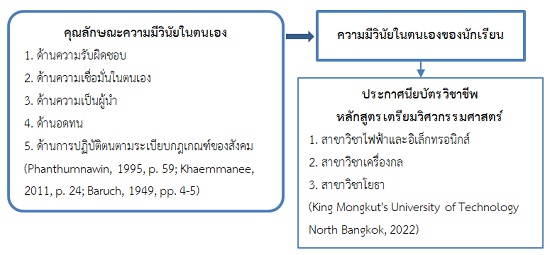A STUDY OF SELF-DISCIPLINE OF VOCATIONAL CERTIFICATE STUDENTS IN PRE-ENGINEERING COURSE
DOI:
https://doi.org/10.14456/nrru-rdi.2023.29Keywords:
Self-discipline, Vocational certificate students, Pre-engineering curriculum studentsAbstract
The conduct of students must arise from voluntary willingness rather than being forced, as it is crucial for the ability to self-develop. This is the reason behind conducting research. The objective is to study the level of self-discipline and compare the self-discipline of professional certificate-level students in the Pre-Engineering Curriculum. The study focuses on three disciplines: Electrical and Electronics Engineering, Mechanical Engineering, and Civil Engineering. The sample group consists of 297 individuals selected through simple random sampling. A questionnaire survey was a Likert scale with 4 levels, with an entire reliability coefficient of 0.909. A total of 248 data sets were collected through online channels amounts to 83.50%. The level of self-discipline was analyzed using descriptive statistics to calculate the mean, standard deviation, and hypothesis testing using a one-way analysis of variance. The research findings revealed that 1) Overall, the level of self-discipline among students was at a moderate level ( =2.91, S.D.=0.36). And when comparing the self-discipline of students across three different academic disciplines that align with the hypothesized expectations in all five aspects comprising in terms of responsibility, self-confidence, leadership, perseverance, and adherence to societal rules and regulations, there were no differences in the statistically significant level of 0.05. Therefore, educational institutions need to establish strategies for fostering self-discipline among students in order to cultivate age-appropriate and education-level-appropriate self-discipline skills.
References
Academic Services Division, King Mongkut's University of Technology North Bangkok. (2022). Report on the number of students in the Vocational Certificate (Voc.) level of the Pre-Engineering Program, Thai-German Pre-Engineering School, Industrial Technology College, King Mongkut's University of Technology North Bangkok, Semester 2/2022. (Unpublihsed manuscript). (In Thai)
Ausubel, D. P. (1972). Ego Development and the Personality (3rd ed.). New York : Grune and Stration.
Best, J. W. (1981). Research in Education (3rd ed.). Englewood cliffs, New Jersey : Prentice-Hall.
Caldwell, B. J., & Spinks, J. M. (1990). The self-managing school : Administrative science quarterly. London : Tayor and Francis Mimeographed.
Chiu, Y. T., Copsey-Blake, M., Nikolopoulou, M., & Wong, B. (2021). A mapping of graduate attributes: What can we expect from UK university students?. Higher Education Research & Development, 41(4), 1340-1355. https://doi.org/10.1080/07294360.2021.1882405
Clifford, M. M. (1981). Practice in Educational Psychology. Boston : Houghton Miffin.
Hall, R. H. (2003). Organization structure, processes and education. New Jersey : Prentice-Hall International.
Jinakul, D. (2022). Research Design. Retrieved January 31, 2023, from http://web.sut.ac.th/dpn/document/ir/2565/4%20Research%20Design%20Mart-IRD-SUT.pdf (In Thai)
Jutharop, M. (1997). Educational Psychology (2nd ed.). Bangkok : Aksara Phiphat. (In Thai)
Kasemsuk, S. (2021). Development of Promoting Self-Discipline Model of Students in Banglane Wittaya School. Thesis, Master of Education Program in Educational Administration, Faculty of Interdisciplinary Studies, Christian University of Thailand, Bangkok. (In Thai)
Khaemmanee, T. (2011). Pedagogical science: body of knowledge for effective learning process (14th ed. (Extended Edition)). Bangkok : Chulalongkorn University Press. (In Thai)
Khatimah, Y., H. (2021). Perilaku disiplin anak pada pelaksanaan belajar dari rumah(BDR) di RA Al-Akhyar. Tematik, 7(1), 52-61. https://doi.org/10.26858/tematik.v7i1.20860
King Mongkut's University of Technology North Bangkok. (2022). Thai-German Pre-Engineering School website. Retrieved January 31, 2023, from https://www.kmutnb.ac.th/faculty-and-agencies/bangkok/วทยาลยเทคโนโลยอตสาหกรรม/โรงเรยนเตรยมวศวกรรมศาสตร-ไทย-เยอรมน.aspx (In Thai)
Krejcie, R. V., & Morgan, D. W. (1970). Education and Psychological Measurement. New York : Minisota University.
Ministry of Education. (1998). Educational Development Guide 1998. Bangkok : Ministry of Education. (In Thai)
Office of the Secretary-General, Office of the Education Council. (2017). National Education Plan 2017-2036 (2nd ed.). Bangkok : Office of the Secretary-General, Office of the Education Council. (In Thai)
Phanthumnawin, D. (1995). Ethical Tree Theory : Research and Human Development. Bangkok : Academic Document Promotion Project National Institute of Development Administration. (In Thai)
Skinner, B. F. (1974). About Behaviorism. New York : Alford A Kuapt F.
Tirakanan, S. (2008). Research Methodology in Social Sciences: Guidelines for Practice (7th ed.). Bangkok : Chulalongkorn University Printing Press. (In Thai)
Tonglad, S. (2021). Developing Guidelines for Strengthening Students’ Self-Discipline Under the Office of Kalasin Primary Education Area 3. Thesis, Master of Education Program in Educational Administration and Development, Mahasarakham University, Mahasarakham. (In Thai)
Veri, S., Jalinus, N., Maksum, H., Edi, I., & Jamilah, Y. (2019). The Effect of Learning Discipline on Learning AchievementofClassXStudentsinVocational High School 5 Padang. International Journal of Educational Dynamics, 2(1), 263-273. https://doi.org/10.24036/ijeds.v2i1.256
Wanichbuncha, K. (2001). Statistical Analysis : Statistics for Decision Making (5th ed.). Bangkok : Chulalongkorn University Printing House. (In Thai)
Wiggins, J. S. (1971). The Psychology of Personality. New York : Addison-Wesley.
Zhao, J., Luo, L., & Wang, H. (2023). Self-discipline on multiple channels. arXiv preprint arXiv:2304.14224. https://doi.org/10.48550/arXiv.2304.14224

Downloads
Published
How to Cite
Issue
Section
License

This work is licensed under a Creative Commons Attribution-NonCommercial-NoDerivatives 4.0 International License.




